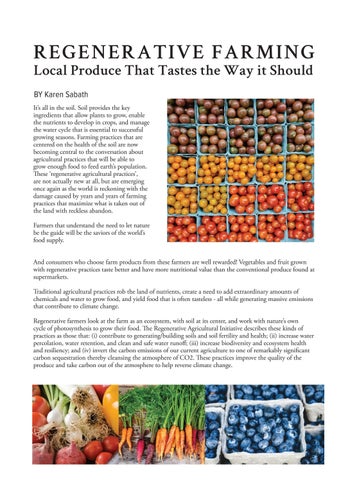REGENERATIVE FARMING
REGENERATIVE FARMING Local Produce That Tastes the Way it Should BY Karen Sabath It’s all in the soil. Soil provides the key ingredients that allow plants to grow, enable the nutrients to develop in crops, and manage the water cycle that is essential to successful growing seasons. Farming practices that are centered on the health of the soil are now becoming central to the conversation about agricultural practices that will be able to grow enough food to feed earth’s population. These ‘regenerative agricultural practices’, are not actually new at all, but are emerging once again as the world is reckoning with the damage caused by years and years of farming practices that maximize what is taken out of the land with reckless abandon.
And consumers who choose farm products from these farmers are well rewarded! Vegetables and fruit grown with regenerative practices taste better and have more nutritional value than the conventional produce found at supermarkets. Traditional agricultural practices rob the land of nutrients, create a need to add extraordinary amounts of chemicals and water to grow food, and yield food that is often tasteless - all while generating massive emissions that contribute to climate change. Regenerative farmers look at the farm as an ecosystem, with soil at its center, and work with nature’s own cycle of photosynthesis to grow their food. The Regenerative Agricultural Initiative describes these kinds of practices as those that: (i) contribute to generating/building soils and soil fertility and health; (ii) increase water percolation, water retention, and clean and safe water runoff; (iii) increase biodiversity and ecosystem health and resiliency; and (iv) invert the carbon emissions of our current agriculture to one of remarkably significant carbon sequestration thereby cleansing the atmosphere of CO2. These practices improve the quality of the produce and take carbon out of the atmosphere to help reverse climate change.
BEDFORD & NEW CANAAN
Orchard Hill Organics in Katonah started in 1994, as owner David Rowe’s personal garden. As the garden expanded, Rowe made the choice for the farm to serve the community. Wilson Chang joined in last year’s growing season as Farm Manager, having 15 years of growing experience running his Ridgefield farm. They plant in a combination of outdoor beds and high tunnels, or hoop houses, which lets them continue to grow seasonal produce all year round. They strive to be the community source for fresh produce, and sell at the Hastings Winter Farmer Market, the John Jay Homestead Farmers Market,and through their virtual market online. And, when the post-COVID environment allows, they plan to open a farm store right on the property. “A lot of people have never tasted the real flavors of produce. The best genetics for heirloom tomatoes are mutually exclusive with the genetics for tomatoes grown for long shelf lives that need to be transported thousands of miles to supermarkets around the world. Tomatoes that are the most delicious ripen on the vine and are eaten soon after. We want to educate people about what food is supposed to taste like.”
Farmers that understand the need to let nature be the guide will be the saviors of the world’s food supply.
124
Orchard Hill Organics
M A R / A P R
2 0 2 1
Chang is motivated by the weather and season, and lets nature dictate his deadlines, including the challenges of the general trend for warmer weather. Chang notes, “When I first started farming, I remember we didn’t have to worry about irrigation, and there was more predictable pacing to the weather.” Now 15 years later, the number of intense storms and the heavy rains that come with them have made moisture harder and harder to manage. “Average precipitation hasn’t changed much, but we need to adapt to fewer but intense downpours that cause soil erosion.” And Chang thinks a lot about how what they’re doing is affecting the wildlife and believes that whatever passes through the farm needs to come out better at the other end.
M A R / A P R
2 0 2 1
BEDFORD & NEW CANAAN
125









